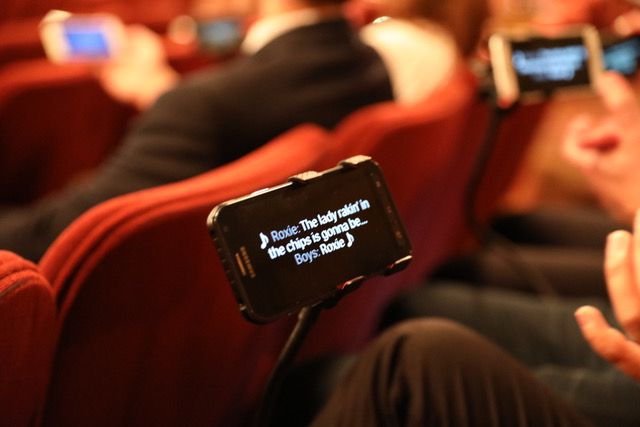Incident at 'Hadestown' over captioning device calls for greater understanding of accessibility needs in theatre
by Chris Peterson, OnStage Blog Founder
Last night it was reported that an audience member at Broadway’s ‘Hadestown’ was reprimanded multiple times, including mid-performance, by actress Lillias White for recording the show from the front row.
Or so Ms. White thought.
The audience member was actually using a captioning device that helps people who have hearing loss follow the dialogue and the action of the show as it’s occurring on stage.
The audience member, Samantha Coleman, was left horrified by the incident and posted both on Twitter and Instagram about it.
In her emotional video Coleman, who is deafblind and a performer herself, doesn’t think that Ms. White reprimanded her out of malice, but that it does illustrate the lack of awareness and education about accessibility needs in theatres.
“I see this as an opportunity for conversation, education, and change,” she states in the Instagram caption. ”I desperately hope my story can prevent another horrifying and embarrassing experience for someone else. It was my worst fear, and it was realized. I don’t know if/when I’ll feel comfortable using a captioning device again.”
Before discussing accessibility in theatre, especially Broadway houses, let’s address the ‘Hadestown’ incident.
While I don’t know her personally and have only met her through industry events, Lillias White is a lovely person. I agree with Ms. Coleman that her reprimand was likely not out of malice, Also, had Lilias White known that a captioning device was being used in the front row, I’m positive she would never have done what she did. I am willing to bet she will be horrified learning about this today.
Captioning devices come in all shapes and sizes, but some are as small as a phone. Shown below is one that was used at an Arena Stage production in Washington, D.C.
So when held in a theatre, pointed at the stage, it’s fair to think it might be someone recording the show. But this illustrates the need for protocols to be created/followed when people with disabilities are attending performances and to call attention to theatres to think more about actual accessibility needs.
I don’t know if Ms. Coleman notified the front-of-house staff(FOH) before the show that she needed to use that device; she doesn’t say that in her video. But I’ve seen that when the FOH staff is notified, it is relayed to the entire cast and crew, to prevent things like this from happening. If Ms. White knew about Ms. Coleman’s device, there would be no issue.
But this incident highlights the need for greater education and awareness in theatres. I’ve seen stories of similar issues in theatre spaces worldwide that fail when meeting the needs of audience members with disabilities. While a theatre may not be able to accommodate everyone, it should certainly try. Often, theatres do just enough to adhere to ADA requirements but won’t go far beyond what gets them their approval.
What’s even more worrisome is that as bad as it may be for audience members, it can be worse for performers with disabilities as well.
If a theatre staff hasn’t taken the steps to educate their staff or adjust their houses to be more accessible, I recommend this guide by Melanie Malson. It goes over everything.
I want to end this with some words from Samantha Coleman herself. She wrote on Instagram,
“Theatre systemically is an exclusionary space for people who are disabled, has always been. This is just shining light on that. If we do not address the underlying issues of inequality in theatre, we will never truly progress as an industry. We are just now reaching the technological peak, where tech can allow more people to see and understand theatre. As we continue to make inclusionary progress in the audience tech, how do we create an equitable experience for every person in the building? Can we push ourselves, to strive to do better? Can we allow everyone to experience theatre?”
My hope is that incidents like these become fewer and far between. But when they do happen, I hope theatre staffs learn from this and follow/institute protocols for accessibility and also educate themselves on what more they can do as technology advances.

